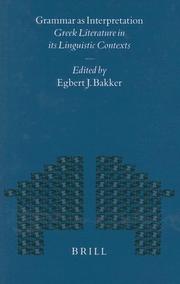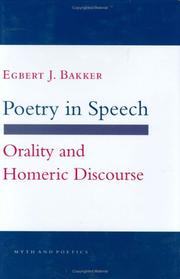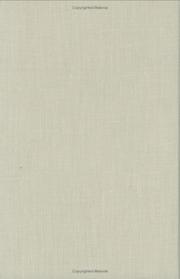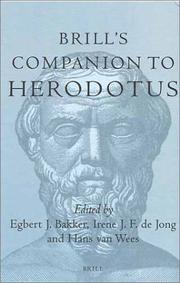| Listing 1 - 10 of 10 |
Sort by
|

ISBN: 9004107304 9004330062 9789004107304 9789004330061 Year: 1997 Volume: 171 Publisher: Leiden ; New York : Brill,
Abstract | Keywords | Export | Availability | Bookmark
 Loading...
Loading...Choose an application
- Reference Manager
- EndNote
- RefWorks (Direct export to RefWorks)
Looking at its subject from the standpoint of modern discourse analysis, this study deals with problems of style and grammar in Greek and Latin texts. Its aim is to shed light on the interaction between the mechanism of the Greek and Latin languages as interactive tools and the structure of the texts that have come down to us. The interpretive orientation offered differs from most literary studies in its taking linguistic observations as point of departure, and its considering grammar as a positive factor in the interpretive process. It differs from most linguistic studies in the field in demonstrating the importance of linguistic methodology for classical philology in general. The book contains studies of various authors, genres, and text types, preceded by an introductory essay on the role of grammar in philology.
Classical Greek literature --- Classical Greek language --- Literary rhetorics --- Grammar --- Greek literature --- Language and culture --- Greek language --- Rhetoric, Ancient --- Littérature grecque --- Langage et culture --- Grec (Langue) --- Rhétorique ancienne --- History and criticism --- Theory, etc --- Histoire et critique --- Théorie, etc --- Grammaire --- Rhetoric, Ancient. --- Theory, etc. --- Grammar. --- -Greek literature --- -Language and culture --- -Rhetoric, Ancient --- Classical languages --- Greek rhetoric --- Latin language --- Latin rhetoric --- Culture and language --- Culture --- Balkan literature --- Byzantine literature --- Classical literature --- Classical philology --- Greek philology --- Indo-European languages --- -Theory, etc --- Rhetoric --- Littérature grecque --- Rhétorique ancienne --- Théorie, etc --- Ancient rhetoric --- History and criticism&delete& --- Language and culture. --- Greece. --- al-Yūnān --- Ancient Greece --- Ellada --- Ellas --- Ellēnikē Dēmokratia --- Elliniki Dimokratia --- Grčija --- Grèce --- Grecia --- Gret͡sii͡ --- Griechenland --- Hellada --- Hellas --- Hellenic Republic --- Hellēnikē Dēmokratia --- Kingdom of Greece --- République hellénique --- Royaume de Grèce --- Vasileion tēs Hellados --- Xila --- Yaṿan --- Yūnān
Book
ISBN: 9781405153263 1405153261 9781444317404 1118782917 1444317393 9786612482359 144433168X 1782685723 1444317407 1282482351 Year: 2010 Publisher: Malden, MA: Wiley-Blackwell,
Abstract | Keywords | Export | Availability | Bookmark
 Loading...
Loading...Choose an application
- Reference Manager
- EndNote
- RefWorks (Direct export to RefWorks)
Greek language --- Greek philology. --- Grec (Langue) --- Philologie grecque --- History. --- Histoire --- Greek philology --- History --- Geschichte. --- Greek language - History --- Grec (langue)
Book
ISBN: 110723249X 1107356938 1107343569 1107347319 110734106X 1107348560 1107344816 1139047728 9781107341067 9781139047722 9780521111201 052111120X 1316506975 9781316506974 9781107356931 9781107343566 9781107347311 9781107348561 9781107344815 Year: 2013 Publisher: Cambridge : Cambridge University Press,
Abstract | Keywords | Export | Availability | Bookmark
 Loading...
Loading...Choose an application
- Reference Manager
- EndNote
- RefWorks (Direct export to RefWorks)
This comprehensive study of the Odyssey sees in meat and meat consumption a centre of gravitation for the interpretation of the poem. It aims to place the cultural practices represented in the poem against the background of the (agricultural) lived reality of the poem's audiences in the archaic age, and to align the themes of the adventures in Odysseus' wanderings with the events that transpire at Ithaca in the hero's absence. The criminal meat consumption of the suitors of Penelope in the civilised space of Ithaca is shown to resonate with the adventures of Odysseus and his companions in the pre-cultural worlds they are forced to visit. The book draws on folklore studies, the anthropology of hunting cultures, the comparative study of oral traditions, and the agricultural history of archaic and classical Greece. It will also be of interest to narratologists and students of folklore and Homeric poetics.
Meat in literature. --- Homer. --- Homerus. --- Arts and Humanities --- History
Book
Year: 2018 Publisher: Ithaca : Cornell University Press,
Abstract | Keywords | Export | Availability | Bookmark
 Loading...
Loading...Choose an application
- Reference Manager
- EndNote
- RefWorks (Direct export to RefWorks)

ISBN: 0801432952 9781501722776 1501722778 9780801432958 1501722786 Year: 2018 Publisher: Cornell University Press
Abstract | Keywords | Export | Availability | Bookmark
 Loading...
Loading...Choose an application
- Reference Manager
- EndNote
- RefWorks (Direct export to RefWorks)
Applying linguistic theory to the study of Homeric style, Egbert J. Bakker offers a highly innovative approach to oral poetry, particularly the poetry of Homer. By situating formulas and other features of oral style within the wider contexts of spoken language and communication, he moves the study of oral poetry beyond the landmark work of Milman Parry and Albert Lord.One of the book's central features, related to the research of the linguist Wallace Chafe, is Bakker's conception of spoken discourse as a sequence of short speech units reflecting the flow of speech through the consciousness of the speaker. Bakker shows that such short speech units are present in Homeric poetry, with significant consequences for Homeric metrics and poetics. Considering Homeric discourse as a speech process rather than as the finished product associated with written discourse, Bakker's book offers a new perspective on Homer as well as on other archaic Greek texts. Here Homeric discourse appears as speech in its own right, and is freed, Bakker suggests, from the bias of modern writing style which too easily views Homeric discourse as archaic, implicitly taking the style of classical period texts as the norm. Bakker's perspective reaches beyond syntax and stylistics into the very heart of Homeric-and, ultimately, oral-poetics, altering the status of key features such as meter and formula, rethinking their relevance to the performance of Homeric poetry, and leading to surprising insights into the relation between "speech" and "text" in the encounter of the Homeric tradition with writing.
Discourse analysis, Literary. --- Epic poetry, Greek --- Oral tradition --- Oral-formulaic analysis. --- Poetics --- Speech in literature. --- History and criticism. --- History --- Homer --- Criticism and interpretation. --- Formulaic analysis, Oral --- Folk literature --- Folklore --- Literary discourse analysis --- Rhetoric --- Literary style --- History and criticism --- Methodology --- Homeros --- Homère --- Hóiméar --- Hūmīrūs --- Gomer --- Omir --- Omer --- Omero --- Ho-ma --- Homa --- Homérosz --- האמער --- הומירוס --- הומר --- הומרוס --- هومر --- هوميروس --- 荷马 --- Ὅμηρος --- Гамэр --- Hamėr --- Омир --- Homero --- 호메로스 --- Homerosŭ --- Homērs --- Homeras --- Хомер --- ホメーロス --- ホメロス --- Гомер --- Homeri --- Hema --- Pseudo-Homer --- Pseudo Omero --- Homerus --- Historical & comparative linguistics

ISBN: 0674962605 0674020464 9780674020467 9780674962606 0674261887 Year: 1997 Volume: 1 Publisher: Cambridge, Mass. : Harvard University Press,
Abstract | Keywords | Export | Availability | Bookmark
 Loading...
Loading...Choose an application
- Reference Manager
- EndNote
- RefWorks (Direct export to RefWorks)
Written Voices, Spoken Signs is a stimulating introduction to new perspectives on Homer and other traditional epics. Taking advantage of recent research on language and social exchange, the nine essays in this volume focus on performance and audience reception of oral poetry. These innovative essays by leading scholars of Homer, oral poetics, and epic invite us to rethink some key concepts for an understanding of traditional epic poetry. Egbert Bakker examines the epic performer's use of time and tense in recounting a past that is alive. Tackling the question of full-length performance of the monumental Iliad, Andrew Ford considers the extent to which the work was perceived as a coherent whole in the archaic age. John Miles Foley addresses questions about spoken signs and the process of reference in epic discourse, and Ahuvia Kahane studies rhythm as a semantic factor in the Homeric performance. Richard Martin suggests a new range of performance functions for the Homeric simile. And Gregory Nagy establishes the importance of one feature of epic language, the ellipsis. These six essays centered on Homer engage with fundamental issues that are addressed by three essays primarily concerned with medieval epic: those by Franz Bäuml on the concept of fact; by Wulf Oesterreicher on types of orality; and by Ursula Schaefer on written and spoken media. In their Introduction the editors highlight the underlying approach and viewpoints of this collaborative volume.Reviews of this book: "Despite its wide range of topics and approaches, the volume has a clear thematic focus. All contributors seek to leave behind the more formal concerns of past generations of scholars and aim instead at an understanding of orality as that which is (conceptually or actually) close, immediate, or performed. In their joint search for the new picture, classicists, linguists, and medievalists discover a range of different 'oralities'." --J. Haubold, Classical Review
Epic poetry --- Literature, Comparative --- Mythology, Greek, in literature --- Written communication --- Oral interpretation of poetry --- Oral-formulaic analysis --- Oral tradition --- History and criticism --- Theory, etc. --- Congresses. --- Greek and medieval --- Medieval and Greek --- Comparative literature --- Theory, etc --- Poésie épique --- Littérature comparée --- Poésie --- Communication écrite --- Analyse des formules orales --- Tradition orale --- Congresses --- Histoire et critique --- Théorie, etc. --- Congrès --- Grecque et médiévale --- Lecture publique --- Homer --- Criticism and interpretation --- Greek and Medieval --- Formulaic analysis, Oral --- Poetry reading --- Reading poetry aloud --- Heroic poetry --- Tradition, Oral --- Oral communication --- Folklore --- Oral history --- Folk literature --- Poetry --- Written discourse --- Written language --- Communication --- Discourse analysis --- Language and languages --- Visual communication --- Philology --- Methodology --- Oral interpretation --- Homeros --- Homère --- History and criticism&delete& --- Homerus --- Europe --- Epic poetry [Greek ] --- Epic poetry [Medieval ] --- Literature [Comparative ] --- Greece --- Oral tradition - Europe - Congresses. --- Epic poetry, Greek - History and criticism - Theory, etc. - Congresses. --- Epic poetry, Medieval - History and criticism - Theory, etc. - Congresses. --- Literature, Comparative - Greek and medieval - Congresses. --- Literature, Comparative - Medieval and Greek - Congresses. --- Oral interpretation of poetry - Congresses. --- Written communication - Greece - Congresses. --- Oral-formulaic analysis - Congresses. --- Oral tradition - Greece - Congresses. --- Hóiméar --- Hūmīrūs --- Gomer --- Omir --- Omer --- Omero --- Ho-ma --- Homa --- Homérosz --- האמער --- הומירוס --- הומר --- הומרוס --- هومر --- هوميروس --- 荷马 --- Ὅμηρος --- Гамэр --- Hamėr --- Омир --- Homero --- 호메로스 --- Homerosŭ --- Homērs --- Homeras --- Хомер --- ホメーロス --- ホメロス --- Гомер --- Homeri --- Hema --- Pseudo-Homer --- Pseudo Omero --- Epic poetry - History and criticism - Theory, etc. - Congresses. --- Mythology, Greek, in literature - Congresses.
Book
ISBN: 9780521111201 9781139047722 9781316506974 Year: 2013 Publisher: Cambridge [etc.] Cambridge University Press
Abstract | Keywords | Export | Availability | Bookmark
 Loading...
Loading...Choose an application
- Reference Manager
- EndNote
- RefWorks (Direct export to RefWorks)
"This comprehensive study of the Odyssey sees in meat and meat consumption a centre of gravitation for the interpretation of the poem. It aims to place the cultural practices represented in the poem against the background of the (agricultural) lived reality of the poem's audiences in the archaic age, and to align the themes of the adventures in Odysseus' wanderings with the events that transpire at Ithaca in the hero's absence. The criminal meat consumption of the suitors of Penelope in the civilised space of Ithaca is shown to resonate with the adventures of Odysseus and his companions in the pre-cultural worlds they are forced to visit. The book draws on folklore studies, the anthropology of hunting cultures, the comparative study of oral traditions, and the agricultural history of archaic and classical Greece. It will also be of interest to narratologists and students of folklore and Homeric poetics"--
Meat in literature --- Homer. --- Meat in literature. --- Literary collections --- Ancient, Classical et Medieval --- bisacsh --- bisacsh. --- Bisacsh.

ISBN: 9004120602 9004217584 9789004120600 9789004217584 9004169660 Year: 2002 Publisher: Leiden ; Boston : Brill,
Abstract | Keywords | Export | Availability | Bookmark
 Loading...
Loading...Choose an application
- Reference Manager
- EndNote
- RefWorks (Direct export to RefWorks)
Herodotus’ Histories can be read in many ways. Their literary qualities, never in dispute, can be more fully appreciated in the light of recent developments in the study of pragmatics, narratology, and orality. Their intellectual status has been radically reassessed: no longer regarded as naïve and ‘archaic’, the Histories are now seen as very much a product of the intellectual climate of their own day - not only subject to contemporary literary, religious, moral and social influences, but actively contributing to the great debates of their time. Their reliability as historical and ethnographic accounts, a matter of controversy even in antiquity, is being debated with renewed vigour and increasing sophistication. This Companion offers an up-to-date and in-depth overview of all these current approaches to Herodotus’ remarkable work.
History, Ancient --- Histoire ancienne --- Historiography. --- Historiographie --- Herodotus. --- Historiography --- Herodotus --- History [Ancient ] --- History (Herodotus) --- Hērodotou historiai (Herodotus) --- Historiai (Herodotus) --- Historiae (Herodotus) --- Mousai (Herodotus) --- Herodotus (Herodotus) --- Histories (Herodotus) --- Musae (Herodotus) --- Hērodotou Halikarnēssēos Historiōn logoi ennea (Herodotus) --- Historiōn logoi ennea (Herodotus) --- History, Ancient - Historiography
Book
ISBN: 2600007520 9782600007528 Volume: 52 Publisher: Genève: Fondation Hardt,
Abstract | Keywords | Export | Availability | Bookmark
 Loading...
Loading...Choose an application
- Reference Manager
- EndNote
- RefWorks (Direct export to RefWorks)
Epic poetry, Greek --- Greek epic poetry --- Epic poetry, Classical --- Greek poetry --- History and criticism --- Homer --- Homeros --- Homère --- Criticism and interpretation --- Conferences - Meetings --- Homerus --- Congresses --- Poésie épique grecque --- Histoire et critique --- Congrès --- Hóiméar --- Hūmīrūs --- Gomer --- Omir --- Omer --- Omero --- Ho-ma --- Homa --- Homérosz --- האמער --- הומירוס --- הומר --- הומרוס --- هومر --- هوميروس --- 荷马 --- Ὅμηρος --- Гамэр --- Hamėr --- Омир --- Homero --- 호메로스 --- Homerosŭ --- Homērs --- Homeras --- Хомер --- ホメーロス --- ホメロス --- Гомер --- Homeri --- Hema --- Pseudo-Homer --- Pseudo Omero --- Epic poetry, Greek - History and criticism - Congresses --- Poésie épique grecque --- Grieks. --- Dichtkunst. --- Epiek. --- Epic poetry, Greek. --- Homer. --- Critique et interprétation
Book

ISBN: 3110751968 3110750740 Year: 2022 Publisher: Berlin ; Boston : De Gruyter,
Abstract | Keywords | Export | Availability | Bookmark
 Loading...
Loading...Choose an application
- Reference Manager
- EndNote
- RefWorks (Direct export to RefWorks)
This is the second volume on the mechanisms of oral communication in ancient Greece, focused on epic poetry, a genre with deep roots in orality. Considering the critical debate about orality and its influence on the composition, diffusion and transmission of the archaic epic poems, the survey provides a reconsideration and a reassessment of the traces of orality in the archaic epic poetry, following their adaptation in the synchronic and diachronic changes of the communicative system. Combining the methods of cognitive science, and the historical and literary analysis of the texts, the research explores the complexity of the literary message of the Greek epic poetry, highlighting its position in a system of oral communication. The consideration of structural and formal aspects, i.e. the traces of orality in the narrative architecture, in the epic diction, in the meter and the formulaic system, as well as the vestiges of the mixture of orality and writing, allows to reconstruct a dynamic frame of communicative modalities which influenced and enriched the archaic epic poetry, providing it with expressive potentialities destined to a longlasting permanence in the history of the genre.
LITERARY CRITICISM / Ancient & Classical. --- Transcodification. --- Translation Studies. --- ancient communicative system. --- archaic Greek epic poetry. --- culture. --- orality.
| Listing 1 - 10 of 10 |
Sort by
|

 Search
Search Feedback
Feedback About UniCat
About UniCat  Help
Help News
News